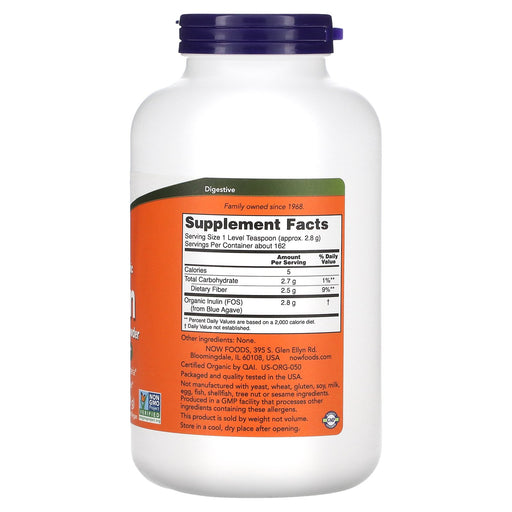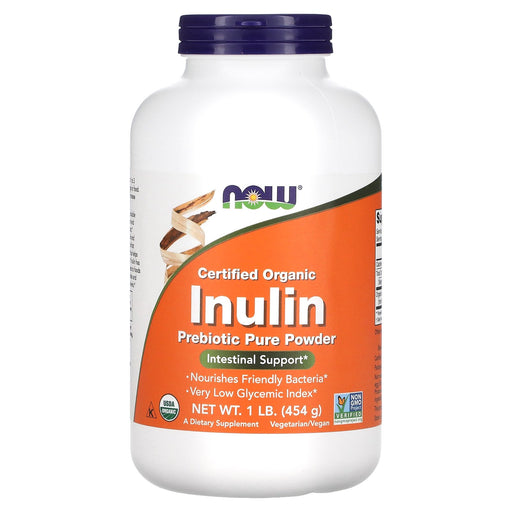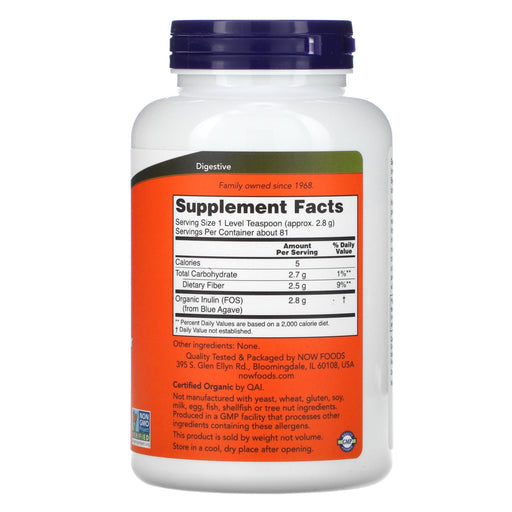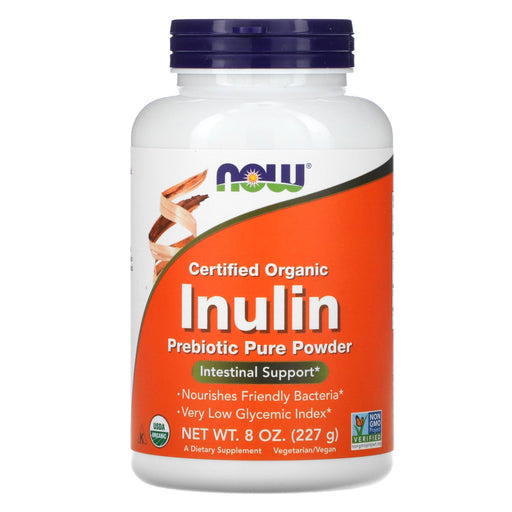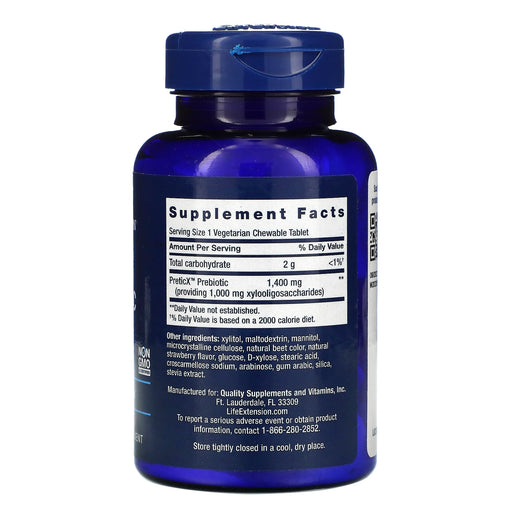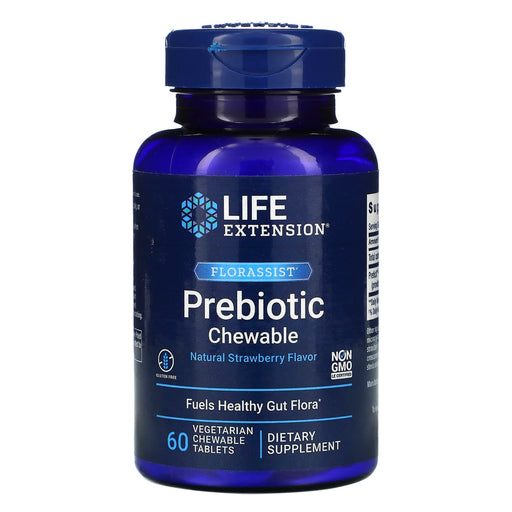
Nurturing Your Gut Health with Prebiotic Fiber (Inulin)
Prebiotic fiber, such as inulin, plays a crucial role in supporting digestive health and overall well-being by nourishing the beneficial bacteria in your gut. By incorporating prebiotic fiber supplements into your daily routine, you can help promote a healthy gut microbiome, improve digestion, and support various aspects of health.
What is Prebiotic Fiber (Inulin)?
Inulin is a type of soluble prebiotic fiber that is naturally found in various plants, such as chicory root, Jerusalem artichokes, and onions. As a prebiotic, inulin serves as a food source for the beneficial bacteria (probiotics) in your gut, helping them thrive and maintain a healthy balance within your digestive system.
Unlike other types of dietary fiber, inulin is not digested or absorbed by the human body. Instead, it passes through the digestive tract and is selectively fermented by the beneficial bacteria in the colon, producing short-chain fatty acids that nourish the gut lining and support overall digestive health.
Benefits of Prebiotic Fiber (Inulin) Supplementation
Incorporating prebiotic fiber (inulin) supplements into your health regimen may offer several potential benefits, including:
- Supporting Gut Health: By nourishing the beneficial bacteria in your gut, inulin helps maintain a healthy balance of gut microbes, which is essential for optimal digestive function and overall health.
- Improving Digestion: Inulin can help promote regular bowel movements, alleviate constipation, and support overall digestive comfort by increasing stool bulk and softness.
- Enhancing Nutrient Absorption: The short-chain fatty acids produced by the fermentation of inulin can help improve the absorption of essential minerals, such as calcium and magnesium.
- Supporting Immune Function: A healthy gut microbiome is closely linked to a strong immune system, and by nourishing the beneficial bacteria in your gut, inulin can help support optimal immune function.
- Promoting Satiety: Inulin can help promote feelings of fullness and reduce appetite, which may support weight management efforts when combined with a balanced diet and regular exercise.
Choosing the Best Prebiotic Fiber (Inulin) Supplement
When selecting a prebiotic fiber (inulin) supplement, consider the following factors to ensure you choose a high-quality product that meets your needs:
- Source and Purity: Look for supplements that use high-quality, pure inulin derived from trusted sources, such as chicory root or Jerusalem artichokes.
- Dosage: Choose a supplement that provides an effective daily dose of inulin, typically ranging from 2-10 grams, depending on your individual needs and tolerance.
- Quality and Transparency: Opt for supplements that are manufactured by reputable companies, free from artificial additives and contaminants, and clearly label their ingredients and dosages.
- Brand Reputation: Select supplements from trusted brands with a history of producing high-quality, science-backed products and a commitment to transparency and safety.
- Synbiotic Formulas: Consider supplements that combine prebiotic fiber (inulin) with probiotics for a synergistic approach to gut health support, as prebiotics help nourish and promote the growth of the beneficial probiotics in your gut.
Maximizing the Benefits of Prebiotic Fiber (Inulin) Supplements
To get the most out of your prebiotic fiber (inulin) supplement, consider the following tips:
- Start Slowly: When introducing inulin into your diet, start with a low dose and gradually increase over time to allow your digestive system to adjust and minimize potential side effects like bloating or gas.
- Stay Hydrated: Drink plenty of water throughout the day to support optimal digestion and the movement of fiber through your digestive tract.
- Pair with a Balanced Diet: While prebiotic fiber supplements can provide valuable support for gut health, they should be used in conjunction with a balanced, nutrient-rich diet that includes plenty of whole foods, fruits, vegetables, and other sources of dietary fiber.
- Consider Probiotic Synergy: Combining prebiotic fiber (inulin) with probiotic supplements or probiotic-rich foods, like yogurt or kefir, can help create a synergistic effect, promoting the growth and survival of beneficial gut bacteria.
- Store Properly: Keep your prebiotic fiber (inulin) supplement in a cool, dry place, away from direct sunlight and heat, to maintain its potency and freshness.
Support Your Gut Health and Overall Well-Being with Prebiotic Fiber (Inulin)
If you're looking to nurture your gut health, improve digestion, and support overall well-being, prebiotic fiber (inulin) supplements are a valuable addition to your wellness routine. By nourishing the beneficial bacteria in your gut, inulin can help you maintain a healthy gut microbiome and experience the numerous benefits of optimal digestive health.
Witness the power of prebiotic nutrition by exploring our curated selection of high-quality prebiotic fiber (inulin) supplements. With a commitment to purity, efficacy, and your individual needs, Health Orchard is here to support you on your journey towards optimal gut health and overall vitality.
Frequently Asked Questions about Prebiotic Fiber (Inulin)
1. What is prebiotic inulin good for?
Prebiotic inulin is a type of soluble fiber that offers several health benefits, including:
- Supporting digestive health by promoting the growth of beneficial gut bacteria
- Improving bowel regularity and stool consistency
- Enhancing mineral absorption, especially calcium and magnesium
- Supporting blood sugar control and insulin sensitivity
- Promoting feelings of fullness and reducing appetite, which may support weight management
- Supporting immune function through interactions with gut bacteria
2. Is it okay to take inulin every day?
For most people, it is safe and beneficial to consume inulin every day, either through food sources or supplements. The recommended daily intake of inulin for digestive health benefits is typically around 5-10 grams per day, which can be gradually increased up to 20-30 grams per day for some individuals. However, it's important to start with a low dose and gradually increase over time, as sudden high doses of inulin may cause digestive side effects like bloating, gas, or diarrhea in some people. It's also important to drink plenty of water when consuming inulin to support optimal digestion and prevent constipation.
3. What is prebiotic fiber supplement good for?
Prebiotic fiber supplements, like inulin, are good for supporting various aspects of health, including:
- Digestive health: Prebiotics provide food for beneficial gut bacteria, promoting their growth and activity. This can help improve bowel regularity, stool consistency, and overall digestive comfort.
- Immune function: The gut microbiome plays a key role in immune regulation, and prebiotics can help support a healthy balance of gut bacteria for optimal immune function.
- Mineral absorption: Prebiotics like inulin can enhance the absorption of minerals like calcium and magnesium, which are important for bone health, muscle function, and other physiological processes.
- Blood sugar control: Some studies suggest that prebiotics may help improve blood sugar control and insulin sensitivity, which is important for metabolic health and reducing the risk of type 2 diabetes.
- Weight management: Prebiotic fibers can promote feelings of fullness and reduce appetite, which may support weight management when combined with a healthy diet and lifestyle.
4. What is an example of prebiotic inulin?
Some examples of prebiotic inulin include:
- Chicory root inulin: This is the most common and well-studied form of inulin, extracted from the roots of the chicory plant. It is often used in supplements and added to foods like yogurt, protein bars, and baked goods.
- Agave inulin: Derived from the blue agave plant, this type of inulin is sometimes used as a natural sweetener and prebiotic ingredient in foods and beverages.
- Jerusalem artichoke inulin: Also known as sunchoke, this vegetable is a natural source of inulin that can be consumed cooked or raw, or used to make prebiotic supplements.
- Dandelion root inulin: The roots of the dandelion plant are another natural source of inulin, often used in herbal teas and supplements for digestive and liver support.
- Banana inulin: Green (unripe) bananas are a natural source of resistant starch, a type of prebiotic fiber similar to inulin. Banana flour or green banana powder can be used as a prebiotic ingredient in smoothies, baked goods, and supplements.
5. When should I take prebiotic inulin?
Prebiotic inulin can be taken at any time of day, depending on personal preference and tolerance. However, some general guidelines for timing inulin intake include:
- With meals: Taking inulin with food can help reduce the risk of digestive side effects like bloating or gas, as the fiber is digested more slowly and evenly when mixed with other nutrients.
- Before bedtime: Some people find that taking inulin before bed helps promote a more restful sleep and regular morning bowel movements. However, this may not be suitable for everyone, especially those who are sensitive to digestive discomfort at night.
- Spread throughout the day: For those taking higher doses of inulin (more than 10 grams per day), it may be beneficial to split the dose into smaller amounts taken at different times of day, such as with breakfast, lunch, and dinner. This can help prevent sudden large doses that may cause digestive discomfort.
6. Can I take inulin at night?
Yes, you can take inulin at night, and some people may find benefits from doing so, such as:
- Improved sleep qualit
- Regular morning bowel movements
- Reduced digestive discomfort during the day
However, it's important to note that individual tolerances and responses to inulin can vary, and some people may find that taking it at night causes digestive discomfort or interferes with sleep quality. If you experience any negative side effects from taking inulin at night, it may be better to take it earlier in the day, such as with breakfast or lunch.


